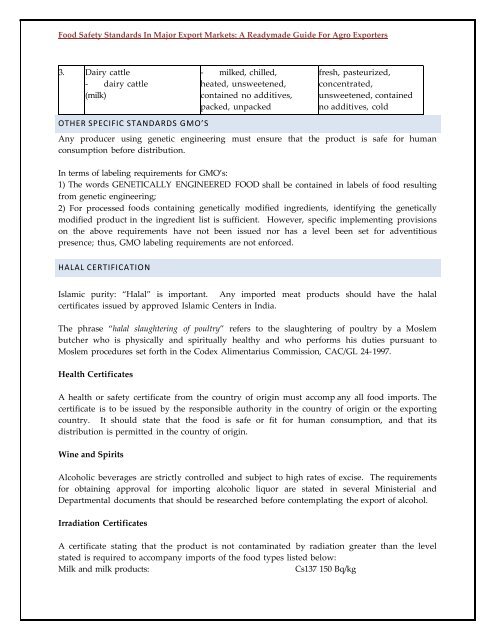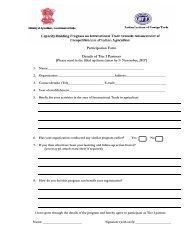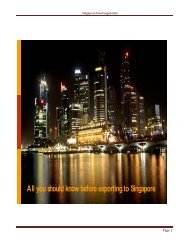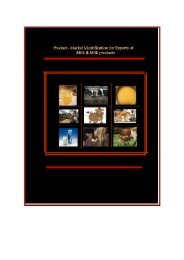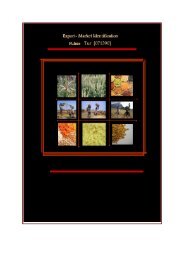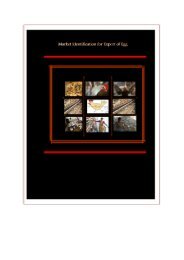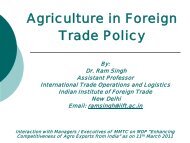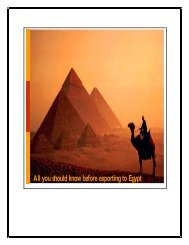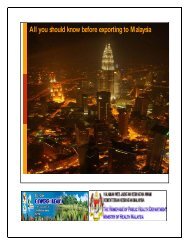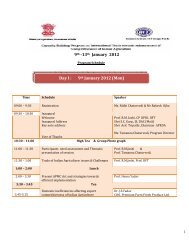All you should know before exporting to Indonesia - Ministry of ...
All you should know before exporting to Indonesia - Ministry of ...
All you should know before exporting to Indonesia - Ministry of ...
You also want an ePaper? Increase the reach of your titles
YUMPU automatically turns print PDFs into web optimized ePapers that Google loves.
Food Safety Standards In Major Export Markets: A Readymade Guide For Agro Exporters<br />
3. Dairy cattle<br />
‐ dairy cattle<br />
(milk)<br />
OTHER SPECIFIC STANDARDS GMO’S<br />
‐ milked, chilled,<br />
heated, unsweetened,<br />
contained no additives,<br />
packed, unpacked<br />
fresh, pasteurized,<br />
concentrated,<br />
unsweetened, contained<br />
no additives, cold<br />
Any producer using genetic engineering must ensure that the product is safe for human<br />
consumption <strong>before</strong> distribution.<br />
In terms <strong>of</strong> labeling requirements for GMO’s:<br />
1) The words GENETICALLY ENGINEERED FOOD shall be contained in labels <strong>of</strong> food resulting<br />
from genetic engineering;<br />
2) For processed foods containing genetically modified ingredients, identifying the genetically<br />
modified product in the ingredient list is sufficient. However, specific implementing provisions<br />
on the above requirements have not been issued nor has a level been set for adventitious<br />
presence; thus, GMO labeling requirements are not enforced.<br />
HALAL CERTIFICATION<br />
Islamic purity: “Halal” is important. Any imported meat products <strong>should</strong> have the halal<br />
certificates issued by approved Islamic Centers in India.<br />
The phrase “halal slaughtering <strong>of</strong> poultry” refers <strong>to</strong> the slaughtering <strong>of</strong> poultry by a Moslem<br />
butcher who is physically and spiritually healthy and who performs his duties pursuant <strong>to</strong><br />
Moslem procedures set forth in the Codex Alimentarius Commission, CAC/GL 24‐1997.<br />
Health Certificates<br />
A health or safety certificate from the country <strong>of</strong> origin must accomp any all food imports. The<br />
certificate is <strong>to</strong> be issued by the responsible authority in the country <strong>of</strong> origin or the <strong>exporting</strong><br />
country. It <strong>should</strong> state that the food is safe or fit for human consumption, and that its<br />
distribution is permitted in the country <strong>of</strong> origin.<br />
Wine and Spirits<br />
Alcoholic beverages are strictly controlled and subject <strong>to</strong> high rates <strong>of</strong> excise. The requirements<br />
for obtaining approval for importing alcoholic liquor are stated in several Ministerial and<br />
Departmental documents that <strong>should</strong> be researched <strong>before</strong> contemplating the export <strong>of</strong> alcohol.<br />
Irradiation Certificates<br />
A certificate stating that the product is not contaminated by radiation greater than the level<br />
stated is required <strong>to</strong> accompany imports <strong>of</strong> the food types listed below:<br />
Milk and milk products:<br />
Cs137 150 Bq/kg


